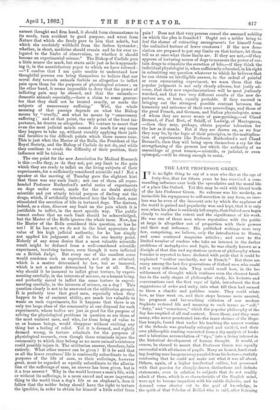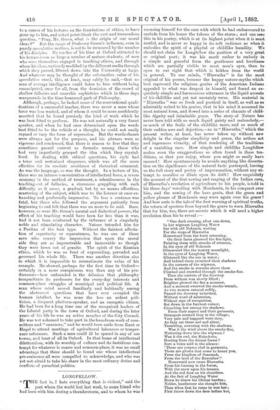THE LATE PROFESSOR GREEN.
IT is no light thing to say of a man who dies at the age of forty-five, that for fifteen years he has exercised a com- manding influence over both the speculative and the moral life of a place like Oxford. Yet this may be said with literal truth of the late Professor Green. So extreme was his modesty, so invincible his repugnance to self-assertion in any form, so care- less was he even of the innocent arts by which the applause of the world is gained and popularity won and kept, that it is only now, when his place is suddenly left empty, that Oxford meu begin clearly to realise the extent and the significance of his work. He was one of those men whose reputation with the public at large is altogether out of proportion with their powers and their real influence. His published writings were very few, comprising, we believe, only the introduction to Hume, and some scattered magazine articles ; and even to the limited number of readers who take an interest in the darker problems of metaphysics and logic, he was chiefly known as a disciple of that dim and mysterious system of philosophy whose founder is reported to have declared with pride that it could be explained "neither succinctly, nor in French." But there are many among the last five generations of Oxford men who could tell a very different tale. They could recall how, in the be- wilderment of thought which confuses even the clearest facul- ties in the early stages of philosophic study, his lectures and conversations cast the first rays of light, introduced the first suggestions of order and unity, into what till then had seemed to them a chaotic and pathless waste. They could relate how, as time went on, and their steps became more assured, his pregnant and far-reaching criticism of our modern Sophists restored life and meaning to such terms as "self," "duty," and "conscience," which the popular philosophy of the day has emptied of all real content. Even those, and they were many, who never penetrated into the inner shrines of the Hege- lian temple, found that under his teaching the narrow routine of the Schools was gradually enlarged and vivified, and their own philosophic reading converted from a dry analysis of books and a laborious accumulation of "tips," into a living interest in the historical development of human thought. It would, of course, be absurd to assert that Professor Green was equally successful with all classes of pupils. Many an honest, hard-read- ing, boating man has gone away puzzled from his lectures, ruefully confessing that he could not make out what it was all about. Others, again, of a higher intellectual calibre, but possessed with that passion for sharply-drawn distinctions and definite statements, even in relation to subjects that do not readily admit of them, which is so characteristic of the English mind, were apt to become impatient with his subtle dialectic, and to demand some shorter cut to the goal of knowledge, in the spirit of that Scholar of Balliol who is said, after listening to a course of his lectures on the foundations of ethics, to have gone up to him, and asked point-blank the curt and tremendous question, "Pray, Mr. Green, what it? the origin of our moral ideas P" But the range of Professor Green's influence, even in purely speculative matters, is not to be measured by the number of his disciples. No teacher of his time at Oxford attracted to his lecture-room so large a number of mature students, of men who were themselves engaged in teaching others, and through whom his ideas, variously modified by the different media through which they passed, filtered down into the University at large. And whatever may be thought of the substantive value of his speculative creed, this, at least, may safely be said,—that no man of average intelligence could listen to him without being emancipated, once for all, from the dominion of the crowd of shallow fallacies and anarchic sophistries which in these days masquerade in the time-honoured garb of Philosophy.
Although, perhaps, he lacked some of the conventional quali- fications of a successful teacher, there was never a man whose force was less wasted, and of whom it could be more confidently asserted that he found precisely the kind of work which he was best fitted to perform. He was not naturally a very fluent speaker, and when he had once determined upon the words best fitted to be the vehicle of a thought, he could not easily expand or vary the form of expression. But the words chosen were always apt for the purpose, and his phrases were so vigorous and condensed, that there is reason to fear that they sometimes passed current as formulre among those who had very imperfectly grasped the idea which they crystal- lised. In dealing with ethical questions, his style had a terse and restrained eloquence, which was all the more effective for its resolute avoidance of rhetorical ornament. As was the language, so was the thought. In a lecture of his, there was an intense concentration of intellectual force, a severe economy in the method of treatment, a relentlessness in the tracking-out of fallacies, a strenuous grappling with each difficulty as it arose, a gradual, but by no means effortless, mastering of the subject, which was to the listener at once ex- hausting and profoundly impressive. To lose a sentence was fatal, but those who followed the argument patiently from beginning to end felt that there was no more to be said. Rare, however, as were Mr. Green's mental and dialectical powers, the effect of his teaching would have been far less than it was, had it not been reinforced by the influence of a singularly noble and stimulating character. Nature intended him for a Puritan of the best type. Without the faintest affecta- tion of superiority or separateness, he was one of those men who convey the impression that upon the moral side they are as impenetrable and immovable as though they were hewn out of granite. The spirit of the Kantian ethics, which he was so fond of expounding, pervaded and governed his whole life. There was another direction also in which it is impossible to overestimate the value of his example. He showed, perhaps for the first time in Oxford— certainly in a more conspicuous way than any of his pre- decessors—how unfounded is the delusion that philosophy incapacitates its professors for the every-day interests and common-place struggles of municipal and political life. A man whose mind moved familiarly and habitually among the abstrusest questions that have ever occupied the human intellect, he was none the less an ardent poli- tician, a frequent platform-speaker, and an energetic citizen. He had been for a long time one of the recognised leaders of the Liberal party in the town of Oxford, and during the later years of his life he was an active member of the City Council. He was not ashamed to take part in the humdrum work of com- mittees and "caucuses," and he would turn aside from Kant or Hegel to attend meetings of agricultural labourers or temper- ance reformers. Such a man could ill be spared in any of our towns, and least of all in Oxford. In that home of intellectual dilettantism, with its worship of culture and its fastidious con- tempt for whatever is coarse and common-place, it was no small advantage that there should be found one whose intellectual pre-eminence all were compelled to acknowledge, and who was yet not afraid to take his share in the most ordinary duties and conflicts of parochial politics.















































 Previous page
Previous page